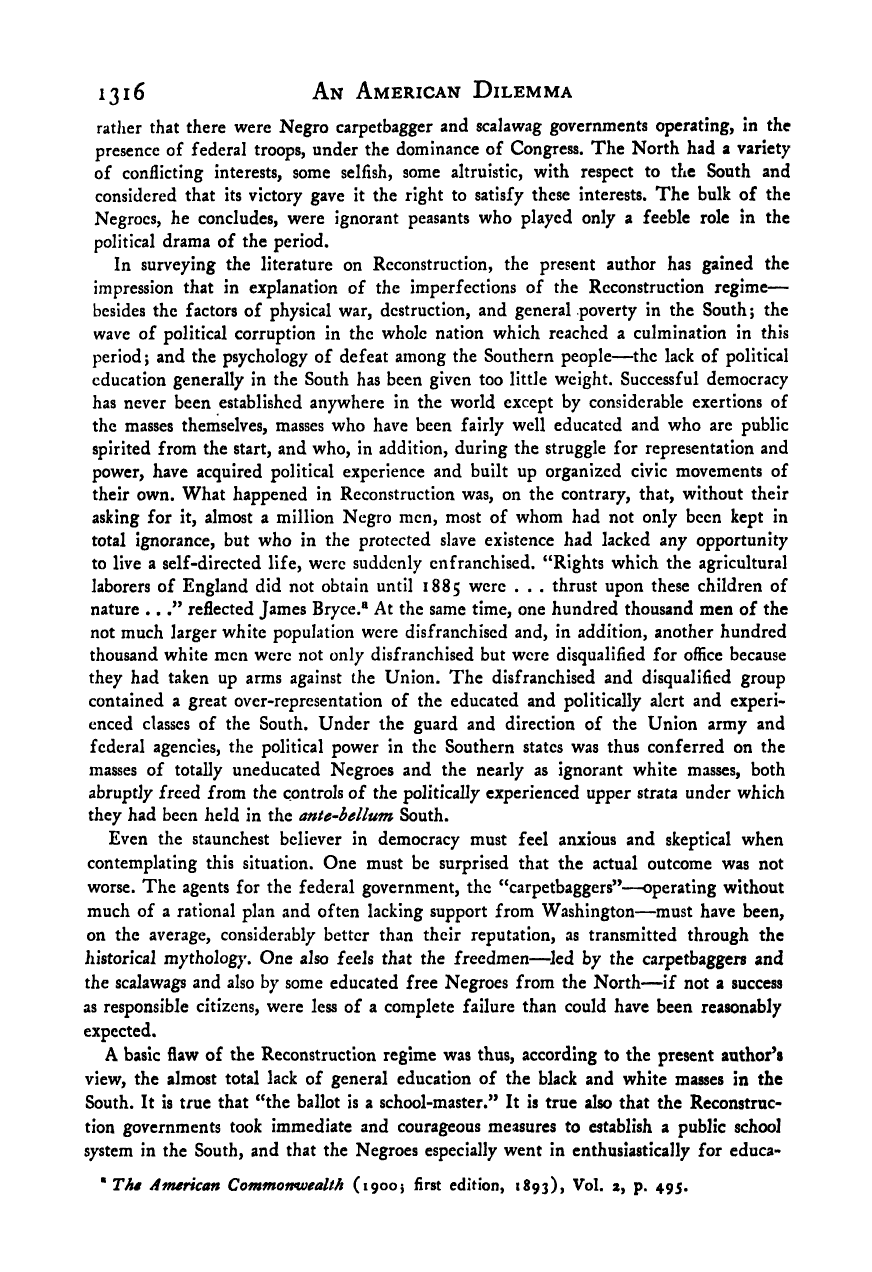Note: Gunnar Myrdal died in 1987, less than 70 years ago. Therefore, this work is protected by copyright, restricting your legal rights to reproduce it. However, you are welcome to view it on screen, as you do now. Read more about copyright.
Full resolution (TIFF) - On this page / på denna sida - Footnotes - Chapter 20

<< prev. page << föreg. sida << >> nästa sida >> next page >>
Below is the raw OCR text
from the above scanned image.
Do you see an error? Proofread the page now!
Här nedan syns maskintolkade texten från faksimilbilden ovan.
Ser du något fel? Korrekturläs sidan nu!
This page has never been proofread. / Denna sida har aldrig korrekturlästs.
1316 An American Dilemma
ratlier that there were Negro carpetbagger and scalawag governments operating, in the
presence of federal troops, under the dominance of Congress. The North had a variety
of conflicting interests, some selfish, some altruistic, with respect to the South and
considered that its victory gave it the right to satisfy these interests. The bulk of the
Negroes, he concludes, were ignorant peasants who played only a feeble role in the
political drama of the period.
In surveying the literature on Reconstruction, the present author has gained the
impression that in explanation of the imperfections of the Reconstruction regime
besides the factors of physical war, destruction, and general poverty in the South; the
wave of political corruption in the whole nation which reached a culmination in this
period; and the psychology of defeat among the Southern people—the lack of political
education generally in the South has been given too little weight. Successful democracy
has never been established anywhere in the world except by considerable exertions of
the masses themselves, masses who have been fairly well educated and who are public
spirited from the start, and who, in addition, during the struggle for representation and
power, have acquired political experience and built up organized civic movements of
their own. What happened in Reconstruction was, on the contrary, that, without their
asking for it, almost a million Negro men, most of whom had not only been kept in
total ignorance, but who in the protected slave existence had lacked any opportunity
to live a self-directed life, were suddenly enfranchised. “Rights which the agricultural
laborers of England did not obtain until 1885 were . . . thrust upon these children of
nature . . reflected James Bryce.® At the same time, one hundred thousand men of the
not much larger white population were disfranchised and, in addition, another hundred
thousand white men were not only disfranchised but were disqualified for office because
they had taken up arms against the Union. The disfranchised and disqualified group
contained a great over-representation of the educated and politically alert and experi-
enced classes of the South. Under the guard and direction of the Union army and
federal agencies, the political power in the Southern states was thus conferred on the
masses of totally uneducated Negroes and the nearly as ignorant white masses, both
abruptly freed from the controls of the politically experienced upper strata under which
they had been held in the ante-bellum South.
Even the staunchest believer in democracy must feel anxious and skeptical when
contemplating this situation. One must be surprised that the actual outcome was not
worse. The agents for the federal government, the “carpetbaggers”—operating without
much of a rational plan and often lacking support from Washington—must have been,
on the average, considerably better than their reputation, as transmitted through the
historical mythology. One also feels that the freedmen—^led by the carpetbaggers and
the scalawags and also by some educated free Negroes from the North—if not a success
as responsible citizens, were less of a complete failure than could have been reasonably
expected.
A basic flaw of the Reconstruction regime was thus, according to the present author’s
view, the almost total lack of general education of the black and white masses in the
South. It is true that “the ballot is a school-master.” It is true also that the Reconstruc-
tion governments took immediate and courageous measures to establish a public school
system in the South, and that the Negroes especially went in enthusiastically for educa-
* The American Commonwealth (1900; first edition, 1893), Vol. 2, p. 495.
<< prev. page << föreg. sida << >> nästa sida >> next page >>